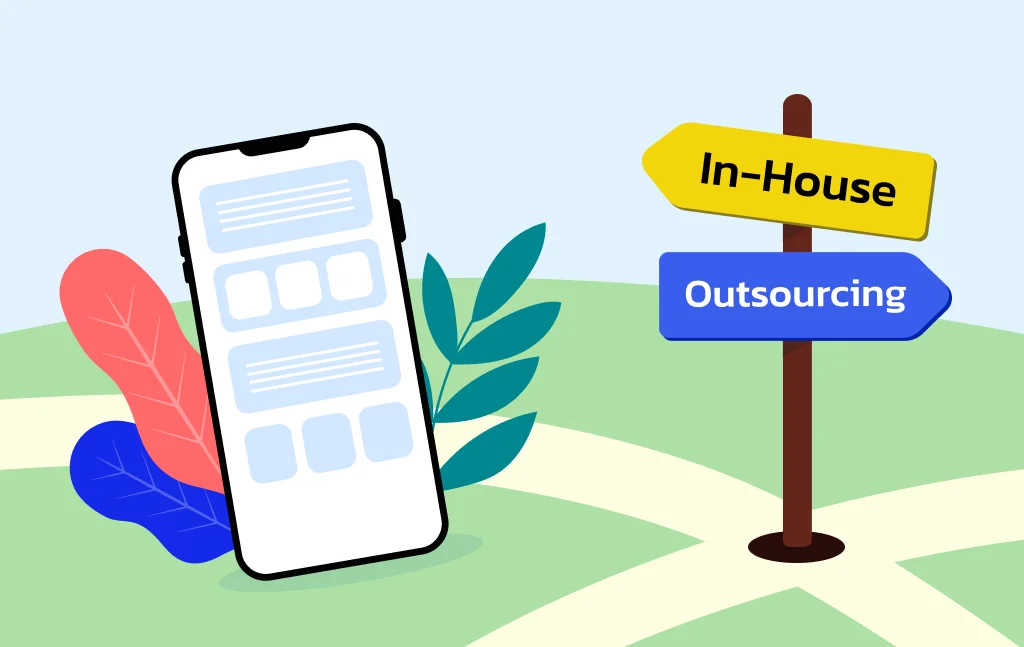
Mobile apps are becoming the backbone of modern enterprises, driving innovation and providing seamless customer experiences. But for startups and entrepreneurs, deciding between in-house development and outsourcing can be a challenging decision. This blog will explore the pros and cons of both options and provide valuable insights to help you make an informed choice.
The Rising Importance of Mobile App Development
With over 3.8 billion smartphone users worldwide, developing a mobile app has become a crucial strategy for businesses of all sizes. Whether you’re a startup looking to make a mark or an established company aiming to enhance customer engagement, mobile apps offer a direct route to your audience’s fingertips. The demand for skilled mobile app developers is higher than ever, making the hiring decision even more critical.
Understanding the Options In-House Development vs. Outsourcing
In-House Development: The Pros and Cons
In-house development means hiring a dedicated team of developers who work exclusively for your company. This option offers several advantages:
- Control: You have direct oversight of the development process, ensuring that the app aligns perfectly with your vision.
- Communication: With your team on-site or easily accessible, communication barriers are minimal, leading to faster decision-making and issue resolution.
- Integration: An in-house team can collaborate closely with other departments, ensuring seamless integration of the app with your existing systems.
However, there are also drawbacks to consider:
- Cost: Building and maintaining an in-house team can be expensive, including salaries, benefits, and overhead costs.
- Talent Pool: Finding and retaining top talent can be challenging, especially in a competitive market.
- Scalability: Scaling your team to meet project demands can be time-consuming and resource-intensive.
Outsourcing: The Benefits and Drawbacks
Outsourcing involves hiring external developers or agencies to handle your mobile app development. This approach offers several benefits:
- Global Talent: Access a broader pool of experts with specialized skills and experience in various technologies.
- Cost-Effective: Generally, outsourcing can be more affordable, especially when working with developers in lower-cost regions.
- Flexibility: Easily scale your development team up or down based on project needs without long-term commitments.
However, outsourcing has its challenges:
- Communication Barriers: Time zone differences and language barriers can lead to miscommunication and delays.
- Control: Managing third-party relationships can be tricky, and you might have less control over the development process.
- Quality Assurance: Ensuring the quality and consistency of the work can be challenging when dealing with external teams.
Factors to Consider Before Making a Decision
Technical Complexity and Expertise
The technical complexity of your app plays a significant role in the hiring decision. If your project requires specialized skills or cutting-edge technology, you might struggle to find the right expertise in-house. In such cases, outsourcing to a specialized agency or freelance experts can be a more viable option.
Project Budget and Timeline
Your budget and timeline, especially when looking to hire mobile app developers, are critical factors in determining whether to choose in-house or outsource. In-house development can be costly upfront but may offer long-term savings if you plan to develop multiple apps or require ongoing updates. On the other hand, outsourcing can provide a quicker and more cost-effective solution for short-term projects or MVPs (Minimum Viable Products).
Long-Term Maintenance and Support
Consider the long-term maintenance and support needs of your app. An in-house team can provide consistent updates and improvements, ensuring that your app remains relevant and functional. However, if you anticipate requiring sporadic updates or prefer a hands-off approach, outsourcing maintenance to a reliable agency might be more practical.
Best Practices for Hiring Mobile App Developers
Identifying the Right Talent or Agency
- Portfolio Review: Evaluate the past work of potential hires or agencies to ensure their experience aligns with your project requirements. Look for relevant case studies, apps, and client testimonials that demonstrate a proven track record of success in similar projects.
- Technical Assessments: Conduct coding tests or technical interviews to assess the developers’ skills and expertise. Tailor these assessments to the specific technologies and frameworks that your project will use, ensuring a match in technical proficiency.
- References and Reviews: Check references and read reviews from previous clients to gauge the reliability and quality of the developers’ work. Reach out to past clients if possible, and ask about their experiences regarding communication, deadlines, and overall satisfaction with the work delivered.
Setting Up Effective Communication and Project Management
- Clear Requirements: Provide detailed project requirements and expectations to avoid misunderstandings. This should include the project scope, milestones, deliverables, timelines, and any specific technical requirements or constraints.
- Regular Updates: Schedule regular check-ins and progress reports to stay informed about the development process. Frequent updates help identify any issues early on and ensure that the project is on track to meet its deadlines.
- Collaboration Tools: Utilize collaboration tools like Slack, Trello, or Jira, along with project management software, to streamline communication and project management. These tools help centralize conversations, task assignments, and progress tracking, making it easier for both in-house teams and external developers to stay coordinated and focused on project goals.
Conclusion
Deciding between in-house development and outsourcing for your mobile app project is a significant decision that can impact your business’s success. By considering the technical complexity, budget, timeline, and long-term maintenance needs, you can make an informed choice that aligns with your business goals. Remember to thoroughly vet potential hires or agencies and establish clear communication channels to ensure a smooth development process.









